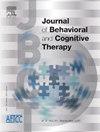The effect of mindfulness-based cognitive therapy counseling on sexual satisfaction and distress among married women with cyclical mastalgia
IF 1.6
Q3 PSYCHIATRY
引用次数: 0
Abstract
Introduction
More than half of the female population suffers from cyclical mastalgia, which can interfere with sexual functioning and impact sexual satisfaction and cause sexual distress. The present study evaluated the efficacy of mindfulness-based cognitive therapy (MBCT) counseling on sexual satisfaction and sexual distress among married women with cyclical mastalgia.
Methods
A randomized controlled clinical trial was conducted in 2024 with 72 married women presenting with cyclical breast pain at comprehensive health centers in Qazvin, Iran. Participants were randomly allocated via quadruple block randomization with allocation concealment using sealed opaque envelopes, into an intervention group (n = 36) receiving eight 90-min MBCT sessions and a control group (n = 36) receiving no intervention. Demographic-obstetric questionnaires, the Visual Analogue Scale (VAS) for pain, the Cardiff Breast Pain Chart, the Female Sexual Satisfaction and Distress Scale, and the Five-Facet Mindfulness Questionnaire were completed by all participants at baseline and at one- and three-month follow-ups. Data were analyzed using repeated-measures analysis of covariance (ANCOVA) in SPSS-27, with statistical significance set at p < 0.05.
Results
The intervention group demonstrated significant improvements across all measured outcomes compared to controls. For sexual satisfaction, mean score differences between groups (baseline, first, and second follow-ups, respectively) were as follows: sexual satisfaction subscale (0.08, 4.49, 6.72; p < 0.001), relationship subscale (0.56, 4.17, 6.56; p < 0.001), and compatibility subscale (−0.33, 4.15, 7.61; p < 0.001). Similarly, sexual distress scores showed marked reductions in relational concern (−0.22, 5.24, 8.33; p < 0.001) and personal concern subscales (−0.97, 3.41, 7.74; p < 0.001). Mindfulness scores increased substantially among those in the intervention group (0.11, 10.02, 15.31; p < 0.001), while pain intensity scores decreased (−0.07, −1.67, −1.69; p < 0.001), indicating both psychological and symptomatic benefits. All changes were statistically significant at one- and three-month follow-ups, confirming the sustained efficacy of MBCT counseling.
Conclusion
The findings suggest that MBCT could be considered as a complementary therapy in managing cyclical mastalgia, particularly for women experiencing sexual dysfunction. Future research to assess long-term effects and compare MBCT with other therapeutic approaches are recommended.
以正念为基础的认知治疗咨询对已婚周期性乳房痛女性性满足和性痛苦的影响
超过一半的女性患有周期性乳房痛,这可能会干扰性功能,影响性满意度并导致性痛苦。本研究评估了正念认知疗法(MBCT)对已婚周期性乳房痛妇女性满足和性痛苦的治疗效果。方法于2024年在伊朗加兹温综合保健中心对72名出现周期性乳房疼痛的已婚妇女进行随机对照临床试验。参与者通过四组随机分组随机分配,使用密封的不透明信封进行分配隐藏,干预组(n = 36)接受8次90分钟的MBCT治疗,对照组(n = 36)不接受干预。所有参与者在基线和1个月和3个月的随访中完成了人口统计学-产科问卷、疼痛视觉模拟量表(VAS)、卡迪夫乳房疼痛表、女性性满意度和痛苦量表以及五方面正念问卷。数据采用SPSS-27的重复测量协方差分析(ANCOVA)进行分析,p <为统计学显著性;0.05.结果与对照组相比,干预组的所有测量结果均有显著改善。在性满意度方面,各组(基线、第一次和第二次随访)的平均得分差异如下:性满意度分量表(0.08,4.49,6.72;p & lt;0.001),关系子量表(0.56,4.17,6.56;p & lt;0.001),兼容性子量表(- 0.33,4.15,7.61;p & lt;0.001)。同样,性困扰得分也显示出关系关注的显著降低(- 0.22,5.24,8.33;p & lt;0.001)和个人关注分量表(- 0.97,3.41,7.74;p & lt;0.001)。干预组正念得分显著提高(0.11,10.02,15.31;p & lt;0.001),疼痛强度评分下降(- 0.07,- 1.67,- 1.69;p & lt;0.001),表明心理和症状上都有益处。在1个月和3个月的随访中,所有的变化都有统计学意义,证实了MBCT咨询的持续疗效。结论MBCT可作为治疗周期性乳房痛的一种辅助疗法,尤其是对有性功能障碍的女性。建议未来研究评估MBCT的长期效果,并将其与其他治疗方法进行比较。
本文章由计算机程序翻译,如有差异,请以英文原文为准。
求助全文
约1分钟内获得全文
求助全文
来源期刊

Journal of Behavioral and Cognitive Therapy
Psychology-Clinical Psychology
CiteScore
3.30
自引率
0.00%
发文量
38
审稿时长
60 days
 求助内容:
求助内容: 应助结果提醒方式:
应助结果提醒方式:


